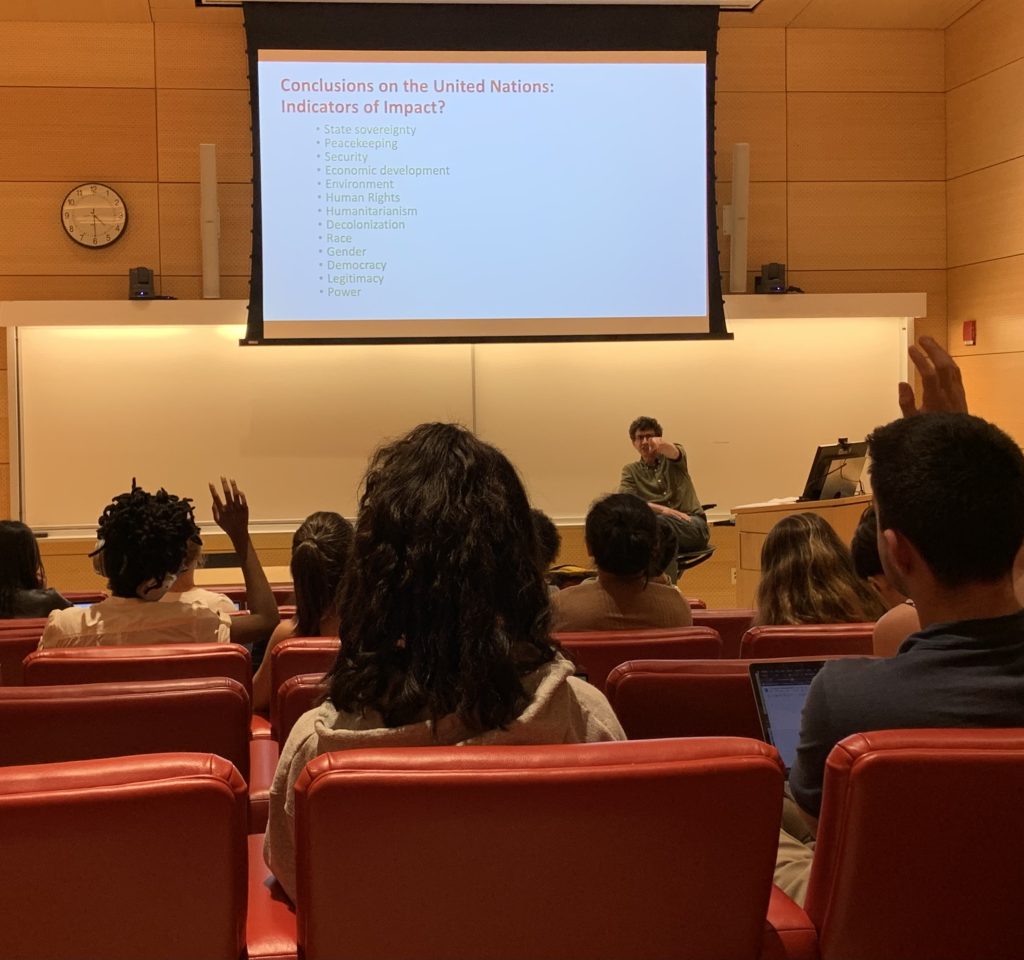Director’s Welcome
By Peter Hoffman, Associate Professor and Director, International Affairs

Welcome to the Fall 2023 semester!
For those taking their first steps toward entering the field of international affairs, this is a fraught but exciting moment. The array and complexities of contemporary global crises are daunting. Efforts to construct a world order that ends wars, hunger, disease, poverty, and repression have made limited progress, and in recent years shown backsliding. Achieving even the often-modest objectives agreed to through multilateral diplomacy is now in doubt. It can be argued that the United Nations, and global governance more broadly, have not delivered. Putting band-aids on these afflictions and calling it victory has not confronted the problems of inequality and injustice that drive the chaos.
Does this mean that the premise that there are global solutions to global problems is questioned? The world has long experienced globalization that connected peoples and cultures and oftentimes, this has inspired the building of global governance architectures. What does it portend when there is a widespread lack of confidence in finding global solutions? What if, in the search for solutions, there is a retreat from the global, a turn inward to regions, or states become more assertive of their sovereignty? Is globalism dead?
This year will be telling—and this is part of why it is an exciting moment. We will have a window into the state of globalism, both its durability and its character. As background, in the fall of 2021, United Nations Secretary-General António Guterres released Our Common Agenda, a set of reform proposals that have stimulated current debates about how to solve global problems. Now, this fall (September 18-19) is the Sustainable Development Goal Summit, which is conducting a midterm review of the Sustainable Development Goals (SDGs) to see assess progress on the 2030 Agenda—spoiler alert: the SDGs are not going well, presently only about 15% of the 169 targets of the SDG’s 17 goals suggest they are on track for being met by 2030. Next fall will be the Summit of the Future, in which ostensibly a Pact for the Future will be signed and contain several proposals for reforming the United Nations. So, over the next year will be an interesting diplomatic dance to achieve something; some countries contend that until the promise of the SDGs is met (including $100 billion in annual financing and a Loss and Damage fund), they are dubious about supporting new reform initiatives. In short, there is complete agreement that things need to change but a lack of trust that anything will fundamentally change because there is no agreement as to what changes are needed. The microcosm of the two summits will be instructive for gauging global cooperation and solidarity, and whether the international system is moving from a liberal world order to an illiberal one predicated increasingly on coercion, power, and inter-imperial coordination, rather than principles of democracy, equality, and effective multilateralism. It will also indicate belief in a globalism that sees the United Nations as the centerpiece of world order. Or, alternatively, if due to changes in technology, capital, or violence, other forms and actors of global governance, perhaps states or from the private sector or civil society, ascend to eclipse the existing architecture and influence global resource allocations. There is a lot at stake that will bear watching this year.
It is also an exciting moment because GPIA will have programming that will allow you to engage with these issues as part of your professional development. In 2023-2024, GPIA will hold events, organize projects, and foster research that makes sense of this moment and speaks to what’s next. Make the most of these opportunities, they will help you build the knowledge and skills you need to contribute to building a more just world order. Note two events connected with the upcoming SDG Summit, in just a couple of weeks:
- Monday, September 18, 5:00 pm – 6:30 pm: “Praxis of Human Rights in the Era of 21st Century Capitalism” is a conversation among notable human rights scholars and practitioners; Alicia Yamin, Philip Alston, Jacqueline Dugard, and Sakiko Fukuda-Parr.
- Tuesday, September 19, 3:00 pm – 5:00 pm: “Women Leaders Talk Geopolitics” features five women from Global Women Leaders Voices for Change & Inclusion, who have each served in senior roles in both national governments and the United Nations, discussing the role of women in politics, multilateralism, peace and security, economic and trade relations, and climate change.
A few other notes on the Fall 2023 semester:
- Monday, September 11: The last day to add/drop a class
- Thursday, November 23-Friday, November 24: Thanksgiving Holiday – school closed
- Tuesday-December 12-Wednesday, December 13: Make-up sessions.
- Friday, December 15: Last day of the semester
- Full-time faculty on sabbatical or leave this semester: Sakiko Fukuda-Parr and Everita Silina.
My best wishes for a wonderful semester.